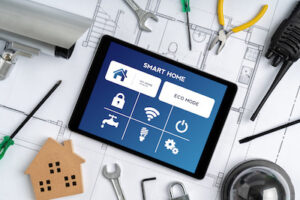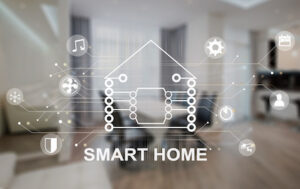The Role of Actuators in Today’s Smart Homes and Appliances
Imagine waking up to the gentle hum of your blinds automatically opening to let in the morning sunlight. As you step into your kitchen, the aroma of freshly brewed coffee greets you, courtesy of a coffee maker that started brewing at your preset time. Of course, this can be easily made your reality, as the latest technological advancements have aided us in making it increasingly more convenient and accessible for the person of this century to walk into a scene that might seem like the wildest dream of someone born at the dawn of the 20th century.
This is the world of smart homes and appliances, where technology seamlessly integrates into everyday life, making tasks easier and more convenient. At the heart of this technological marvel are actuators, the superheroes that quietly make it all happen.

What Are Actuators?
Actuators might sound like something from a science fiction movie, but they’re actually a simple yet ingenious part of modern technology. In the context of smart home appliances, actuators are like tiny helpers that bring movement to various mechanisms. You won’t see them, but they sure are there to propel the movement of the small engines inside the various appliances.
They take signals from a smart device, like your phone or voice assistant, and turn them into action. Remember, when your blinds open, your coffee maker starts, or your fridge door closes on its own, you can thank actuators for making it possible.
How Do Actuators Show Up in Today’s Homes?
In our fast-moving world, actuators are like silent helpers that work behind the scenes to make our daily tasks easier and more convenient. They’re like the wizards of our smart homes, making sure everything runs smoothly from morning to night. It frees you of the constant energy-draining process of doing everything manually. Automation might have its drawbacks, but it also has considerable benefits that many of us have been accustomed to the point of not realizing how interdependent our life has become on them.
From adjusting our surroundings to keeping us safe, actuators are a big part of how our smart homes work. They even help with things like brewing our morning coffee. Here’s how these devices become a part of our everyday lives at home.
Smart Appliances
Smart homes are like choreographed dances where appliances work harmoniously, and electric linear actuator are the choreographers. They coordinate every move, creating a symphony of seamless tasks. Take your smart thermostat, for instance.
When you adjust the temperature on your phone, actuators inside the thermostat receive the command and adjust the heating or cooling system accordingly. This keeps your home at the perfect temperature without you having to lift a finger.
From Voice Commands to Movement
Have you ever marveled at how your voice commands can make things happen in your smart home? Actuators are the ones that translate your words into action. Let’s say you’re in bed and want to dim the lights without getting up. You simply tell your voice assistant, and the actuators in your smart lighting system get to work, adjusting the brightness to your liking. It’s like having your genie that follows your commands.
Safety and Security
Actuators also play a crucial role in keeping your home safe and secure. Consider smart door locks. When you tap on your phone to lock your front door remotely, actuators engage the locking mechanism. They ensure that your home remains secure, even when you’re miles away.
Similarly, if your smart smoke detector detects smoke, actuators can close off air vents to prevent the spread of smoke and protect you and your home.
Bringing Comfort to Everyday Tasks
The beauty of actuators lies in their ability to bring comfort to the most mundane tasks. Remember the coffee maker that breeds before you’re out of bed? Actuators make that possible. They work in tandem with sensors to detect the right time to start brewing, ensuring your cup of joe is ready and waiting when you are.
From adjusting the recline of your smart sofa to ensuring your robotic vacuum navigates obstacles, actuators are the wizards behind the curtain, making your life easier. They are the essential pawns in a larger game of technological advancements and modern living. You would be surprised to learn the extent to which you’ve grown dependent on appliances that could not work without actuators.
Beyond the Home: Actuators in Appliances
Actuators aren’t limited to just smart homes; they’re also instrumental in modern appliances. Think about your washing machine. The gentle spinning and shaking it does to clean your clothes? That’s the work of actuators.
They control the movement and balance of the drum, ensuring your clothes are thoroughly cleaned without causing a ruckus in your laundry room. Even your car’s automatic windows and doors are powered by these small but mighty devices.
Their various functions are essential for providing you with all the necessary appliances that make a 21st-century home. These components are vital in providing the motion necessary for the various mechanisms around your home to function properly. So, don’t be too quick to dismiss the importance of actuators when it comes to your immediate surroundings.
The Future of Actuators and Smart Living
As technology continues to advance, the role of actuators in our lives will only grow. The Internet of Things (IoT), which connects various devices and systems, relies heavily on actuators to bring the physical world into the digital realm. We can expect to see even more seamless integration between our devices and daily tasks, making our lives smarter, more efficient, and more enjoyable.

Frequently Asked Questions (FAQs)
How do actuators work in smart thermostats?
Actuators in smart thermostats regulate temperature by adjusting heating and cooling systems based on user preferences and sensor data, ensuring optimal comfort and energy efficiency.
Can I retrofit my existing appliances with actuators to make them smart?
It is possible to retrofit some appliances with actuators and smart components, but compatibility and feasibility may vary depending on the appliance’s design and age.
Are smart appliances with actuators energy-efficient?
Yes, smart appliances with actuators are generally more energy-efficient because they can optimize their operations based on real-time data and user settings, reducing energy wastage.
How secure are smart locks with actuators?
Smart locks with actuators employ advanced encryption and authentication methods to ensure security. However, like any technology, they may have vulnerabilities, so it’s essential to follow best practices for safeguarding your home.
Can actuators be controlled remotely?
Yes, most actuators in smart devices can be controlled remotely through dedicated apps or voice commands, offering convenience and flexibility.
What is the lifespan of actuators in smart devices?
The lifespan of actuators varies depending on their quality and usage. However, they are designed to be durable and reliable, typically lasting for several years.
Final Thoughts
In conclusion, actuators are truly the backbone of our modern world. They’re the movers and shakers behind the scenes, transforming our smart home dreams into reality. From adjusting our environment to enhancing our safety and convenience, actuators play a pivotal role in shaping how we live. So, the next time your blinds open or your smart vacuum navigates around obstacles, take a moment to appreciate the small but mighty actuators that make it all possible.
